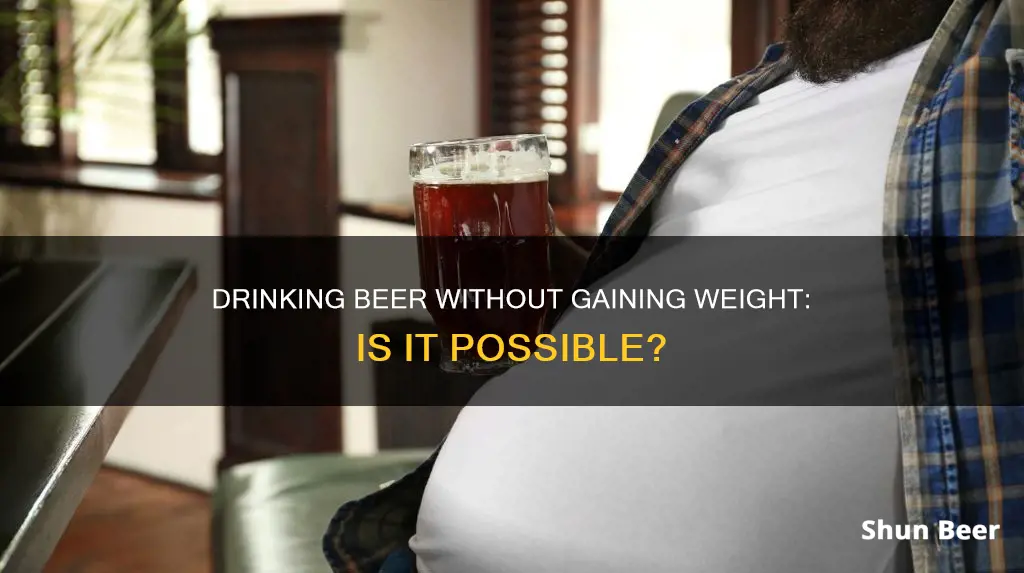
Beer is often associated with an increase in body fat, particularly around the belly, but it is possible to drink beer without gaining weight. Firstly, it is important to understand that any kind of calories, whether from alcohol, sugary drinks, or large portions of food, can increase body fat. A typical beer contains 150 calories, and if you drink several in one sitting, you can end up with a significant calorie overload. Therefore, it is recommended to opt for light beers with 100 calories or fewer, and limit the number of beers consumed per day. Another strategy is to alternate alcoholic drinks with low-calorie, non-alcoholic beverages. In addition to monitoring your beer intake, it is also crucial to pay attention to the food you consume while drinking. Alcohol can increase your appetite, and the food typically available at bars or parties, such as pizza, wings, and fried foods, tend to be high in fat and calories. To avoid binge eating, opt for low-fat, protein-rich foods such as carrot sticks, cucumber sticks, lean meats, and vegetables.
What You'll Learn

Avoid binge drinking
Binge drinking is a common problem, and it's important to address it to maintain a healthy relationship with alcohol. Here are some detailed tips to avoid binge drinking:
Understand the risks of binge drinking:
Binge drinking is defined as consuming enough alcohol in a short period to reach legal intoxication levels. This typically means drinking four or more drinks for women and five or more drinks for men in about two hours. Binge drinking can lead to negative consequences such as impaired judgment, reckless behaviour, and health risks like accidents, injuries, and mental health issues. Understanding these risks can motivate you to make healthier choices.
Set clear limits:
Decide on a specific number of drinks you will allow yourself and stick to it. For example, you could resolve to have only one or two drinks when socialising with friends. Write down this limit, set a reminder, or inform a trusted friend about your intentions. This will help you stay accountable and make it easier to decline additional drinks.
Drink slowly and mindfully:
Take your time when drinking. Sip your beer slowly and savour the taste. Drinking slowly can help you pace yourself and make it easier to stop after reaching your limit.
Alternate with non-alcoholic drinks:
Make it a habit to follow each alcoholic beverage with a non-alcoholic one. Drink water, soda, juice, or even "mocktails" to stay hydrated and reduce the overall amount of alcohol consumed.
Eat before and during drinking:
Having a full stomach can help reduce the amount of alcohol you consume. Eat a good meal before drinking, and continue to snack on healthy foods throughout the night. Opt for protein-rich and low-fat foods, as they will keep you feeling fuller for longer.
Avoid triggers:
Identify and avoid situations or triggers that may lead to binge drinking. For example, if drinking at home is a trigger, avoid keeping alcohol in your house. If certain friends or social settings encourage excessive drinking, consider limiting your time with them or finding new social activities that don't revolve around alcohol.
Find healthier coping mechanisms:
Many people turn to alcohol to cope with stress, anxiety, or boredom. Instead, explore healthier alternatives like going for a walk, practising yoga, or engaging in hobbies that help you relax and manage your emotions.
Seek support:
If you feel that you need additional help, reach out to support groups or organisations like Alcoholics Anonymous (AA) or Moderation Management (MM). These groups can provide guidance and strategies to help you control your alcohol consumption and improve your relationship with alcohol.
Remember, it's all about moderation and making informed choices. By following these tips, you can enjoy beer without overindulging and maintain a healthier lifestyle.
Beer and Hair Transplants: What You Should Know
You may want to see also

Avoid binge eating
Binge eating while drinking beer is a common habit. Drinking alcohol can dull your brain receptors, making it harder to notice when you're full. Plus, alcohol sends feedback to your brain that heightens your desire to eat. So, how can you avoid binge eating while drinking beer?
Firstly, it's important to make a plan before you start drinking. Decide whether you'll allow yourself to eat while drinking or after you've been drinking. If you do decide to eat, make sure you're aware of how much you're consuming and stop when you start to feel full. Eating slowly and mindfully can help with this.
Secondly, try to opt for healthier food options. Go for high-fibre foods like crudites, hummus, crackers and popcorn, or high-protein foods like chicken breast, fish, carrot sticks, cucumber sticks, asparagus and broccoli. These foods will fill you up faster and for longer, reducing your desire to binge eat.
Thirdly, try to maintain a state of semi-sobriety by alternating between alcoholic and non-alcoholic drinks, including water. This will help to slow down your alcohol consumption and reduce the impact of alcohol on your appetite.
Finally, consider fitting in a workout before drinking. This will temporarily increase your metabolism, helping your body to process alcohol faster and reducing the time it has to affect your appetite.
By following these tips, you can help to avoid binge eating while drinking beer and reduce the risk of weight gain.
Beer and Pregnancy: Is One Drink Safe?
You may want to see also

Eat protein-rich foods
Eating protein-rich foods is a great way to balance out drinking beer and maintaining your weight. Firstly, it's important to understand the impact of alcohol on your body. Alcohol is treated as a toxin by your body, and it has no nutritional value. When you consume alcohol, your body stops all other metabolic processes to rid your body of the toxin. This means that food is more likely to be stored as fat when you are drinking.
Protein-rich foods can help counteract this effect. Here are some tips and guidelines to incorporate more protein into your diet while enjoying your beer:
- Opt for low-fat, protein-rich foods on days you plan to drink beer. Lean cuts of meat, chicken breast, fish, and vegetarian options like tofu, eggs, and Greek yogurt are excellent sources of protein.
- Consume a sufficient amount of protein throughout the day, especially before drinking. Eating a protein-rich meal or snack before drinking can help stabilize your energy levels and keep you feeling fuller for longer. This will help you make better food choices and avoid binge eating while drinking.
- Choose high-protein snacks such as whole almonds, chicken or fish on a salad, or a smoothie with protein powder. These options will provide you with the protein you need while also slowing down the absorption of alcohol.
- If you're drinking beer, pair it with protein-rich foods instead of fatty snacks like chicken wings or pizza. Carrot sticks, cucumber sticks, asparagus, and broccoli are great vegetable options that provide crunch and flavour without the extra calories.
- Plan your meals and snacks in advance, especially if you know you'll be drinking. This will help you make healthier choices and avoid reaching for high-calorie, fatty foods.
- Increase your protein intake throughout the week by incorporating a variety of protein sources into your meals and snacks. This can include dairy products, meat, seeds, nuts, legumes, and more.
Remember, while eating protein-rich foods is essential, maintaining a balanced diet is also crucial for overall health. Combine your protein-rich meals with exercise, and you'll be well on your way to enjoying your beer without worrying about weight gain!
Gas Blending: How Does a Beer Gas Blender Work?
You may want to see also

Opt for low-calorie drinks
If you're looking to drink beer without gaining weight, one of the best things you can do is opt for low-calorie options. Beer is typically high in calories, with a standard 12-ounce (355-millilitre) serving of regular beer containing around 150 calories. However, there are plenty of low-calorie options available.
Light beers, for example, typically have around 100 calories or less per 12 ounces (355 millilitres). Some specific low-calorie beers to look out for include Budweiser Select 55, Amstel Light, and Sam Adams Light. These beers have 55, 95, and 119 calories, respectively, allowing you to enjoy a beer without consuming as many calories.
If you're not a fan of light beers, you can also try alternating alcoholic drinks with low-calorie, non-alcoholic beverages. This will help to reduce your overall calorie intake while still allowing you to enjoy your favourite beer.
Another way to cut down on calories is to opt for drinks with a higher alcohol-to-calorie ratio. Liquor, red or white wine (especially drier varieties), Champagne, and light beer are all good options. These drinks tend to have fewer calories for the same amount of alcohol, so you can get a bigger bang for your buck, calorically speaking.
Cocktails and mixed drinks, on the other hand, tend to be high in calories due to the addition of liqueurs, juices, and syrups. A piña colada, for example, can have up to 500 calories in a seven-ounce (200-millilitre) serving. So, if you're looking to cut down on calories, it's best to avoid these types of drinks.
In addition to choosing low-calorie drinks, it's also important to eat a healthy meal before drinking and to have healthy snacks on hand if you get hungry. This will help you resist the temptation of high-calorie bar food, which can often be fatty and fried.
By making smart choices about the drinks you consume and being mindful of your food intake, you can enjoy beer without sacrificing your weight goals.
Beer-Only Diets: A Dangerous, Unhealthy Way to Survive
You may want to see also

Eat before drinking
Eating before drinking is a good way to reduce the risk of overeating and helps your stomach absorb alcohol more slowly. It is important to eat a healthy meal before drinking, as alcohol is high in calories and can increase your appetite. Eating a healthy meal first can help you resist the temptation of high-calorie bar food and prevent you from overeating.
When drinking, it is best to opt for low-fat foods and lean protein. Eating a meal with lean protein and vegetables before drinking is ideal. This is because your body will be unable to use all the fat you eat while drinking, as it prioritises breaking down alcohol. However, the protein will keep you fuller for longer, reducing the likelihood of binge eating later.
It is also a good idea to eat before drinking to help slow down the absorption of alcohol into your system. Eating a meal before drinking can help your body absorb alcohol more slowly, which can help reduce the negative effects of drinking on your body.
In addition to eating a healthy meal before drinking, it is also important to stay hydrated. Drinking water before, during, and after consuming alcohol can help ward off headaches, dehydration, and water retention.
By following these guidelines, you can help maintain your weight while still enjoying an alcoholic beverage. However, it is important to remember that alcohol is high in calories and can contribute to weight gain, so it should be consumed in moderation.
Mixing Beer and Whisky: A Dangerous Cocktail?
You may want to see also
Frequently asked questions
Drinking beer is often associated with an increase in body fat, particularly around the belly. However, drinking beer in moderation (one beer per day or less) is not linked with getting a "beer belly". Here are some tips to help you drink beer without gaining weight:
- Avoid binge drinking.
- Avoid binge eating. Opt for vegetables and protein-rich foods instead.
- Rotate in non-alcoholic or alcohol-free beer.
- Pick low-calorie beers.
Beer is high in calories and can lead to weight gain if consumed in excess. A typical beer has around 150 calories, and if you drink several in one sitting, it can result in a significant calorie overload. Additionally, alcohol can increase your appetite, leading to overeating.
Here are some low-calorie beer options:
- Suntory All-Free: A zero-calorie non-alcoholic beer.
- Budweiser Select 55: Contains 55 calories.
- Amstel Light: A classic light beer with 95 calories.
- Sam Adams Light: A low-calorie, hops-rich lager with a nutty flavor.
- Guinness: A dark Irish stout with 126 calories.
Here are some additional tips to help you drink beer without gaining weight:
- Eat a healthy meal before drinking to help resist the temptation of high-calorie bar food.
- Stay hydrated by drinking water before, during, and after drinking alcohol.
- Choose drinks with a higher alcohol-to-calorie ratio, such as liquor, wine, or light beer.







